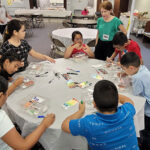Barb Arland-Fye
Editor
Our country’s collective reaction to the massacre at a gay club in Orlando, Fla., on June 11 was swift and largely compassionate, but it’s not enough.

A social media fundraising campaign for victims’ families and survivors has raised more than $5 million. Donors overwhelmed blood centers in Orlando, wanting to help the surviving victims. Countless vigils drew diverse crowds clutching lit candles and crying out for love and an end to gun violence. Three senators, led by Democrat Chris Murphy of Connecticut, filibustered on behalf of gun control. What about a month from now? Will we have moved on and away from dealing with a crisis of hair-trigger reactions to our country’s ills?
Donating one’s blood or money is admirable, but does it make a difference in how we conduct our daily lives in the context of the common good? Are we willing to die to self, even in small ways, to make life better for others? That’s a tall challenge in today’s polarized culture. We refuse to compromise on issues of substance: gun laws, refugees, immigration policy, poverty, water quality and campaign financing among others. We are convinced that it’s the other person who needs to change.
As people who profess to follow Christ, let’s do our part to end the paralysis.
First, re-read last Sunday’s Gospel (Luke 9:18-24), paying particular attention to this passage: “Then he said to all, ‘If anyone wishes to come after me, he must deny himself and take up his cross daily and follow me. For whoever wishes to save his life will lose it, but whoever loses his life for my sake will save it.’” Reflect and pray on that passage as it relates to daily interactions. Do I really need to win that argument? Can I listen attentively to someone with a different opinion? Can I be patient with someone who annoys me?
Second, choose one or two issues — such as gun violence — and study them in depth. The U.S. Conference of Catholic Bishops (www.usccb.org), for example, spells out sensible ideas in a Feb. 12, 2013, letter to the U.S. Senate Committee on the Judiciary titled “Proposals to Reduce Gun Violence: Protecting Our Communities While Respecting the Second Amendment.” The Catholic Messenger provides helpful perspectives on topics in each week’s issue — print and digital. The Iowa Catholic Conference (http://iowacatholicconference.org/) is another good resource.
Third, take action. Write, email or phone state and federal legislators, Iowa’s governor and our faith leaders with well-thought-out views on an issue. Ask Iowa legislators to support a bill that would require the state’s public safety advisory board to provide research and recommendations about the causes and prevention of violence to local communities statewide. The bill stalled this year, and that’s a shame. We can encourage others to act with us; we can join a social action committee in our parish or a civic organization that focuses on making a difference in the lives of those in need.
Fourth, we can make changes in our behavior that move us in the direction of contributing to the common good. Prayer, participation in the Mass and in the sacraments goes a long way toward helping us in the arduous effort to change our behavior. In his apostolic exhortation “Evangelli Gaudium,” Pope Francis observes that we “Christians remain steadfast in our intention to respect others, to heal wounds, to build bridges, to strengthen relationships and to ‘bear one another’s burdens.’”
To live by those intentions means honoring the victims of Orlando and Newtown and San Bernardino by doing the hard work of practicing peace in our daily lives — one deliberate action at a time.
Barb Arland-Fye, Editor










